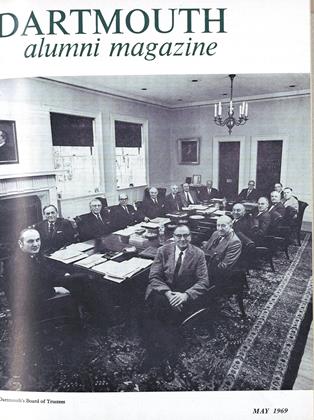THE Tuck School this year has extended its educational reach by offering a series of seminars to its alumni. The objective of the new program is to provide graduates of the School with an opportunity to review some of the newer concepts and analytical techniques that are being applied in the field of business administration. Much of the material presented in the seminars was not a part of the School's curriculum even five years ago.
The seminars are designed so that each topic can be covered thoroughly during a three-day period of lectures and discussions. The opening seminar, February 19 to 22, dealt with "Quantitative Methods and the Computer." During the past month, "Financial Management: Concepts and Innovations" was considered at the second seminar, April 16 to 19. The concluding seminar for the year will be held May 28 to 31 on the topic, "Planning for Tomorrow's Markets."
Although open to all Tuck alumni, the seminars are designed primarily for the graduate with at least five years' experience. For the first two programs, alumni came from all segments of industry and government, and geographical representation was widespread, including a participant from Hawaii.
Alumni attending the seminars are asked to read selected material in preparation for the discussions led by members of the Tuck School faculty. At least six or more faculty members participated in each of the seminars. Extensive use of Tuck's computer facilities is a unique feature of the seminars.
A description of the program of the February seminar shows how a topic is presented to participating business executives. The seminar was opened Thursday morning by Prof. Christopher Nugent, who presented an "Introduction to Probability." Most of the morning was devoted to a consideration of "Decision Tree Analysis" under the guidance of Prof. Leonard E. Morrissey Jr. T'48. Then discussion turned to "The Value of Additional Information," led by Prof. Charles S. Mayer, in a short session before lunch. The afternoon was divided between two topics: "Introduction to Computing" with Professor Nugent and "Forecasting" with Professor Richard S. Bower.
On Friday the discussion continued to focus on the use of computers in business. Prof. Gary Michael Roodman started the morning off with "Introduction to Mathematical Programming," followed by Prof. Willard T. Carleton '56, who described "An Integrated Financial Planning Model." After a brief coffee break, the seminar participants were given an opportunity to experiment with the financial planning model. Just before lunch, Professors Carleton and Roodman presented "Other Applications of Mathematical Programming."
The first part of the afternoon was devoted to a consideration of "Stock Valuation" with Prof. J. Peter Williamson. Then the discussion turned to "General Modeling Concepts," led by Professor Nugent.
The rest of the afternoon and the evening were devoted to "UNIPRODUCT - A Combination of Business Gaming and Simulation" with Prof. Thomas E. Vollmann in charge. After Professor Vollmann's initial presentation, seminar participants were given an opportunity to use Tuck's computer facilities to analyze business problems.
The Saturday morning wrap-up session began with a consideration of "Computters in Marketing" with Professors Mayer, Nugent, and Vollmann participating. The seminar closed with a panel of Professors Bower, Nugent, Vollmann, Williamson, and Robert H. Guest reviewing "Computers and Management." Although the details of quantitative methods or computer programming cannot be taught in a three-day seminar, it is felt that the participants gained an awareness and appreciation of the power of these emerging tools.
Prof. Kenneth R. Davis is faculty coordinator of the 1969 seminars, each of which also has a faculty chairman. In all, 16 members of the Tuck faculty are taking part in the program. Alumni enrolled in the seminars are housed and fed in the Hanover Inn. These accommodations are included in the seminar fee of $350.
Based on this year's experience, Tuck School hopes to offer additional continuing education programs for its alumni and members of its Associate companies. Such continuing' education has become a necessary part of the life of a modern manager. Multinational companies, conglomerates, computer-based management information systems, and new involvements of business in pressing economic, political and social issues of the day are some of the developments that have underscored the need for postgraduate education of business executives.
Leonard E. Morrissey Jr. T'48, Professor of Accounting at Tuck School, lecturingat the February seminar session dealing with "Decision Tree Analysis." All theseminar classes are being held in the lounge of the new Tuck Mall dormitory.
 View Full Issue
View Full Issue
More From This Issue
-
 Feature
FeatureMutual Sensitivity Wins the Day
May 1969 By JOHN DICKEY -
 Feature
FeatureWebster and the Court
May 1969 By THE HONORABLE EARL WARREN -
 Feature
FeatureWarner's 41 Dramatic Years
May 1969 By MARGARET BECK McCALLUM -
 Feature
FeatureMay 17 Event to Salute Eleazar's Starting Point
May 1969 -
 Books
BooksERNEST HEMINGWAY: A LIFE STORY
May 1969 By JEFFREY HART '51 -
 Article
ArticleThe Undergraduate Chair
May 1969 By CHRIS KERN '69
Article
-
 Article
ArticleTRACK TEAM
February, 1910 -
 Article
ArticleDARTMOUTH MEN IN ESCADRILLE LAFAYETTE
December 1917 -
 Article
ArticleReligion
April 1939 -
 Article
ArticleNEWS IN BRIEF
NOVEMBER | DECEMBER 2013 -
 Article
ArticleDartmouth-on-the-Pacific Conference
November 1955 By EDWIN J, DRECHSEL '36 -
 Article
ArticleMiscellany
March 1952 By R. L. Allen '45

